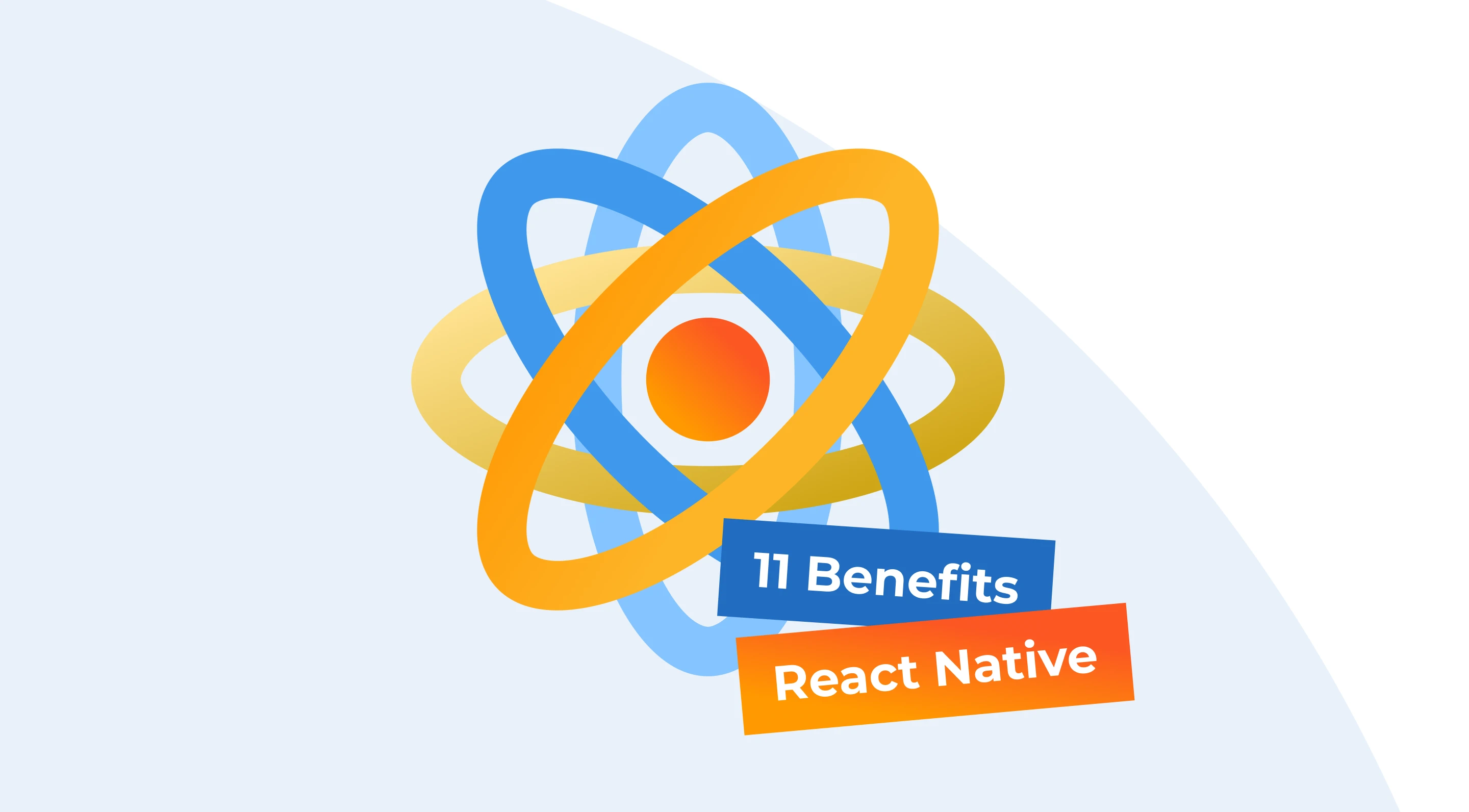SHARE
11 Benefits of React Native over Native Mobile Development

Contents
Contents
React Native and Native app development are the key players in mobile app development today. However, companies like Facebook, Uber, Skype, and Microsoft have adopted React Native.
React Native is a creation of Facebook released in 2015 as an open-source project. React Native combines the best components of React and Native, giving you a taste of each.
It is a JavaScript-based framework that allows users to build apps for Android and iOS. You can use the same codebase to create an application across various platforms.
Native technologies such as Swift or Kotlin only allow developers to develop an application on a specific platform. You would need two development teams to launch an application on the App Store and Play Store. The system-specific scalability can give developers access to tools that make developing for a specific operating system easier in some cases.
Are you considering React Native app development and wondering how it is better than Native? Keep reading to compare React Native to native technologies.
11 Benefits of React Native Development over Native Mobile Development
Consider factors that favor React Native app development over Native app development before selecting a framework to build your mobile app.
There are many benefits of React Native app development compared to Native Mobile application development, as we have indicated below.
React Native is a Cross-Platform Development Framework
The ability to run on Android and iOS gives React Native a competitive advantage over Native. Native limits developers to one platform. The shared codebase makes navigation and designs similar in the two platforms.
React Native Saves on Time
You can use the same code for iOS and Android platforms. Using the same codes means you need one team to make the app available on Android and iOS.
You will need two different teams with Native to write the code individually for Android and iOS. The teams will be responsible for ensuring the availability of the app on both platforms.
React Native is your go-to option if you are looking into time management as ultimately developing the same application for both iOS and Android is a practice of repeating oneself.
Reduced Mobile App Cost with React
Time is money, which means that if you save time by working with one team, you will save on costs. Spend less on the cost of building cross-platform applications than Native apps, where you have to work on each platform simultaneously. And this is not just for the initial build of your mobile app. Once you release your app, you are likely to discover that you want to make a number of changes, and for many, the transition into maintenance and the realization of ongoing costs for supporting app development can be frustrating. This is particularly true if your mobile app doesn’t do anything where access to the native development suites provides a benefit over React Native.
Leveraging the React Native JS framework can help you develop workable apps across iOS and Android for many, many mobile apps.
React-Native is Community-Driven
Being an open-source framework, React Native developers can freely access information, documentation, and ultimately the codebase behind React Native. The free access allows the developers to contribute to the framework at any time, as well.
The many developers available to work on React Native form a community. The developers review a code or project, giving room for feedback from new developers.
The interactions between the existing developers and newbies take place through forum discussions.
Native framework developers work within different programming languages and development experiences, limiting their interactions with new developers. React, on the other hand, is not only the basis for React Native but it is arguably the most popular JavaScript framework used for the web today. That means that the documentation for React and code samples for best practices are in very good shape.
One final cost-saving advantage to React Native vs. native development is the fact that JavaScript, and in particular React, is so widely used even outside of mobile development. Whereas Swift and Kotlin are used specifically for iOS, macOS, and Android development, pretty much the entire web uses JavaScript these days. This makes learning React Native more accessible to web developers.
React Native Allows Code Reusability
The greatest advantage of React Native is the ability to use one code on different platforms, as earlier mentioned. Better yet, you can reuse the same codes to build a mobile app which contributes to time and cost management.
You will have to develop a new code with every application using the Native framework.
Hot & Live Reloading Nature of React Native
Enjoy a quick refresh of an application with live reloading after changing a code. Hot reload allows users to refresh a changed file while retaining its original state.
Hot reloading helps in patching a changed code without reloading the entire application.
The hot and live reload features enable developers to view changes through a preview window when writing the codes.
The reloading feature gives room for real-time feedback while the developers are working on it. Reloading takes place automatically while saving a new code.
White hot reloading or live reloading may not be a reason to pick React Native over native development, these features greatly speed up development processes, making the process of changing styles within your application without needing to login or navigate to the screen you’re focusing on a requirement. Hot loading is indeed very useful on both the web and mobile.
Easy Updates with React Native
Add React Native’s UI components to an existing app to enhance it and give a better user experience. There is no need to rewrite software when improving it like you would with a Native framework.
Increased Flexibility with React Native Mobile App Development
React Native’s UI enables different developers within a team to continue from where another left. There are little to no complications encountered when taking over another developer’s work.
It is also easy for companies to move the platform to another framework. Developers export the app from React Native. The company then continues from where the developers left.
That all being said, we believe that ejecting apps or exporting apps should be done rarely, and that React Native codebases should largely remain in React Native.
Availability of Comprehensive Libraries with React Native
React Native offers a range of libraries that simplify the app development process. Components of pre-developed UI are available, meaning one has access to written codes. Users only have to implement the written codes.
The ESLint library enables the identification of potential errors through the Linting process. One can write code-free bugs using the Enzyme, Chai, Jest, or Mocha libraries. Again, because React Native is written in JavaScript, you will find many of the testing libraries and experiences to be better than native testing experiences that are developed in a silo.
Better App Maintenance Experience with React Native
One only needs to resolve bugs on one platform with React Native. In Native, one has to resolve the bugs individually on each platform.
App maintenance is, therefore, easier and time-effective with React Native compared to Native. Oftentimes the development of the initial build of an app takes weight over maintenance when it comes to choosing React Native vs. Native mobile development. In fact, maintenance should probably have the upper hand in the decision as maintenance never really dies, especially if you want to keep your app available on the newest operating systems. Apps written in Swift or Kotlin using Xcode or, respectively, Android Studio will require developers for both platforms indefinitely for the life of your app. Every time Apple releases a new feature or deprecates another, you still need a native iOS developer to help you out. Same is true of Google and native Android developers. Before choosing React Native vs. Native development, think through maintenance and how much you will have to invest in your app on an ongoing basis.
React Native Use a Familiar Programming Language
Regardless of your opinion on different programming languages, the fact is that React Native, and in particular, JavaScript, are more accessible to software developers than native languages like Swift or Kotlin. React Native uses JavaScript, the most common programming language used by 64.96% of developers.
Companies using React Native can choose their developer team based on JavaScript. The architecture of React Native code makes it easy to upgrade applications.
As a JavaScript framework, developers use React Native to write real and natively rendered applications for both Android and iOS.
It takes time to learn the programming language used in Native mobile apps since one will need proper documentation and strict rules. Kotlin and Swift programming languages are considered strict-typed. While Kotlin will be pretty familiar to Java developers, Swift is rather unique in nature. Either way, neither programming language will be as intuitive as JavaScript, which pretty much every web developer knows.
Have a complete overview of React Native vs. Swift and React Native vs. Kotlin.
Is React Native Easier than Native
According to O’Reilly, React Native is a young framework with challenges like any technology. While React Native has numerous advantages over Native, the latter offers development advantages at times.
Users do not have to worry about other platforms when building a purely native app. Usage on one platform at a time minimizes the risks of bugs compared to React Native, where you might be encouraged to think of the different platforms you are developing for upfront.
When it comes to user experience or supporting different devices for iOS or Android, we don’t find a heavy advantage in leaning towards either native development or React Native. The one area that really changes this equation is when you are supporting apps built for devices outside of phones and tablets. For instance, the Apple Watch or Apple TV will inevitably lead you to open XCode and program within it. You can indeed share code between a React Native and a native mobile app, but it’s a little more intricate than it is to share purely native code for these devices from within XCode.
Native frameworks have each of its screens individually designed for each platform, making the UI/UX experience better.
Does React Native Have a Future?
The statistics show that many love the React Native framework, and it has a future.
It has grown into a renowned framework for building complex hybrid mobile applications. Mobile apps using React Native, such as Facebook, provide a natural user experience due to the advanced features.
React Native has shown growth in the past years and has become a favorite of 42% of cross-platform developers.
The growth remains constant despite notable competition from other frameworks such as Flutter. For now, we see no distinct advantage in risking your app development to Flutter. We see essentially all of the benefits of cross-platform development that Flutter provides within React Native. Additionally, as Flutter is written in Dart, it introduces a new programming language to the mix instead of building off of the popular JavaScript language. Finally, Flutter is developed by Google, and they have somewhat of a reputation for abandoning projects or development platforms that are in their infancy (or, at times, even in the later stages of their lives). For these reasons, we don’t see a business reason to choose Flutter development over React Native. Developers might be interested in Flutter, but we don’t advise it as a business decision.
For a more expanded overview, you can check React Native vs. Flutter.
Facebook aims at creating Fabric, a project that will make the React Native tools interoperable with more than two platforms. Fabric will make the user experience better and more interactive.
Final Thoughts
While no blanket statement can be made about whether you should use React Native or Native technologies, we find that the majority of apps that are cross-platform and remain within tablets and mobile devices will benefit from React Native over native programming languages like Swift or Kotlin. Time, costs, maintenance, and accessibility to non-mobile engineers are just a few of the areas of consideration that go into the decision of whether to use React Native.
Many established companies such as Facebook, Skype, Instagram, and Airbnb use React Native. Using the framework by these companies shows that it is a reliable framework with a future. Ultimately, as an end user, you are unlikely to be able to distinguish apps built with React Native vs. separate native apps for iOS and Android.
Need to build a user-friendly and scalable mobile app using React Native? Flatirons can help. We have the best developers to help you create your desired UI-driven mobile applications.
React Native Development Experts
Flatirons provides React Native development services tailored for your business needs.
Get the CEO's Take
Handpicked tech insights and trends from our CEO.
React Native Development Experts
Flatirons provides React Native development services tailored for your business needs.
Get the CEO's Take
Handpicked tech insights and trends from our CEO.

Perl vs Python: Choosing the Right Scripting Language
Flatirons
Apr 20, 2025
IoT Database: Manage Connected Device Data Efficiently
Flatirons
Apr 14, 2025
Proof of Concept Template: A Step-by-Step Guide
Flatirons
Mar 26, 2025
Objective C vs Swift: Which is Better for iOS App Development?
Flatirons
Mar 25, 2025
Scala vs Kotlin: Comparing the Functional Programming Giants
Flatirons
Mar 22, 2025
IoT Smart City Solutions: Transforming Urban Living
Flatirons
Mar 17, 2025